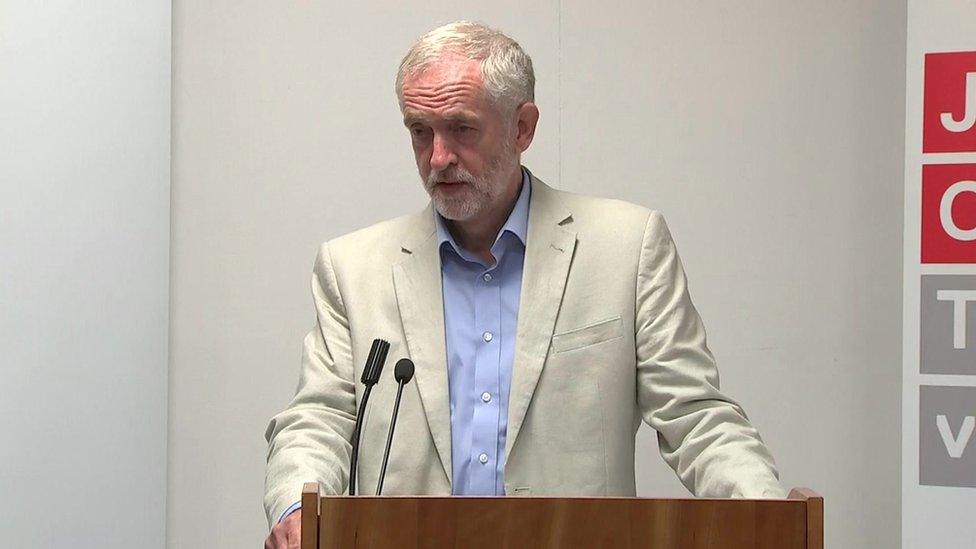Who, What, Why: When can you sit in a reserved seat on a train?
- Published
Virgin Trains has released footage of Mr Corbyn's journey
Labour leader Jeremy Corbyn has been criticised after being filmed sitting on the floor on a Virgin train when there were apparently seats available. So, on a busy train, can you sit in reserved but empty seats?
You can sit in reserved seats on inter-city trains if the person who made the reservation doesn't turn up
But there's no signage that tells you to do this
On a typical British inter-city train there may only be a couple of carriages that are designated unreserved. In the other carriages, many of the seats will be marked as reserved.
And yet, they are often empty.
"When you book online, you [typically] automatically get a seat reservation whether you ask for it or not," says Mark Smith, who runs The Man In Seat Sixty-One rail website.
Corbyn angered by train seat questions
How many people have to stand on trains?
The traveller with an open ticket frequently decides not to get the train for which they had a reservation. If they were booked onto a specific train and miss it, their seat is still marked as reserved.
You are allowed to sit in reserved seats that are not occupied. If you speak to a conductor on a busy train they will tell you to do this. It's usually obvious a few minutes after departure that the person who made the reservation is not coming.
But the problem is there is no sign that tells you to do this. So even on busy trains people will walk past empty reserved seats. There's a further confusion when someone places belongings in an otherwise unoccupied empty seat next to theirs.
Electronic displays
For socially reserved Britons it's not an easy situation, says social historian Joe Moran, author of Shrinking Violets: A field guide to shyness.
"I think on Virgin trains it is often very ambiguous. One of the things shy people have a problem with is social ambiguity - if things aren't clear. There might be a bag on it, people might have gone to the toilet."
There's a slightly different situation in much of the rest of Europe. "On the continent you have to take up your seat within 15 minutes of departure," says Smith.
German IC and ICE trains have electronic displays which initially show a seat as reserved, but which then go blank 15 minutes after departure from the station where the reservation starts. So if unclaimed after 15 minutes, the seat can be used.
"I find this annoying if I'm travelling solo and want to go to the bistro, as I may return to find my reserved seat occupied unless I leave it covered with belongings, but it does solve the problem of reserved seats not being claimed," says Smith.
And there are systems like France's TGV where you must book on to a particular train with a seat reservation to travel. If a train is fully booked, you can't travel on it and have to try to book on a later train. There is no standing.
Post-peak crush
But there are inter-city trains in the UK where people cannot sit down at all. It's all the fault of the fare structure, says Smith.
The system of peak and off-peak walk-on tickets puts massive pressure on the first train after peak time ends. "The 19:00 goes out with people hanging out the door. But the 20:00 is empty," he explains.
That wouldn't explain why Jeremy Corbyn's train may have been, as he put it, "ram-packed", though.
"This whole thing blew up on the 11:00 [London to Newcastle]. If it was rammed something strange is going on," says Smith.
Subscribe to the BBC News Magazine's email newsletter to get articles sent to your inbox.
- Published24 August 2016

- Published23 August 2016
